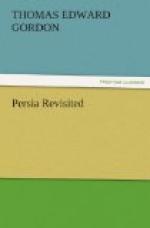The annual Passion-play to commemorate the murder and martyrdom of the progeny of Ali, and the solemn fast-days when their assassins are cursed and reviled, which are observed all over Persia, serve to keep alive their patriotism and pride of independence, for with the Persians, religion and patriotism are synonymous terms. There is probably no country where Church and State are more closely and fortunately bound together than Persia. Had the sovereignty not been Shiah, it would long ago have disappeared between its Sunni neighbours. With them the persecution of the ‘accursed Rafizi,’ as they speak of the sect, is the exercise of a holy duty, and their enslavement by Sunnis is a meritorious act, giving the heretics an opportunity of benefiting by example, and of rescue from perdition by conversion to the orthodox faith. Thus it was that the Hazaras and Shiah inhabitants of the small principalities on the head-waters of the Oxus were sold into Sunni slavery, and the purchase of the Shiah Circassians in the Turkish markets was justified on the same grounds. The bitter experience of ages has taught all Shiahs that, once helplessly at the mercy of the Sunnis, there must be absolute submission on all points. This conviction has buried itself deep in the minds of the Persian people, and they now and then are painfully reminded of the savage readiness of their Sunni neighbours to emphasize the fact.
In 1892 a bazaar quarrel in Herat between Sunni and Shiah traders grew to a disturbance, and culminated in some of the latter, Persian subjects, being slain and their goods plundered, the Moullas solemnly pronouncing their judgment that it was ‘lawful’ for Sunnis to take the lives as well as the property of the heretical Shiahs. The Shah, on the representation of the Meshed religious authorities, addressed a remonstrance to the Amir Abdul Rahman Khan, who, being a strong and wise ruler, made reparation. The religious antagonism is very bitter in Afghanistan, and were it not for the warlike character and good fighting qualities of the Shiah Kizzilbash tribe at Kabul, their presence at the capital would not be tolerated by the bigoted Moullas. The common danger makes the Kizzilbashes a united band and dangerous foe, and arms them to be always ready to fight for their lives. They have become a power which it is the policy of the rulers to conciliate, and thus secure their support. But notwithstanding this, the fanatical hatred of the orthodox Sunni, as representing both Church and State, cannot be suppressed. I was with General Sir William Mansfield (the late Lord Sandhurst) when he, being Commander-in-Chief in India, had a conversation with the Amir Sher Ali of Kabul on general subjects, in the course of which the Amir, in rather a captious manner, made some sharp remarks on what he called the hostile differences in the Christian Church; Sir William rejoined by referring to the great division in Islam between Sunni and Shiah, and asked if there were many of the latter faith at Kabul. A look of displeasure passed over Sher Ali’s face as, half turning towards his people who stood behind him, he said, in a severe tone, ’Yes, there are a few of the dogs there, sons of burnt fathers.’




